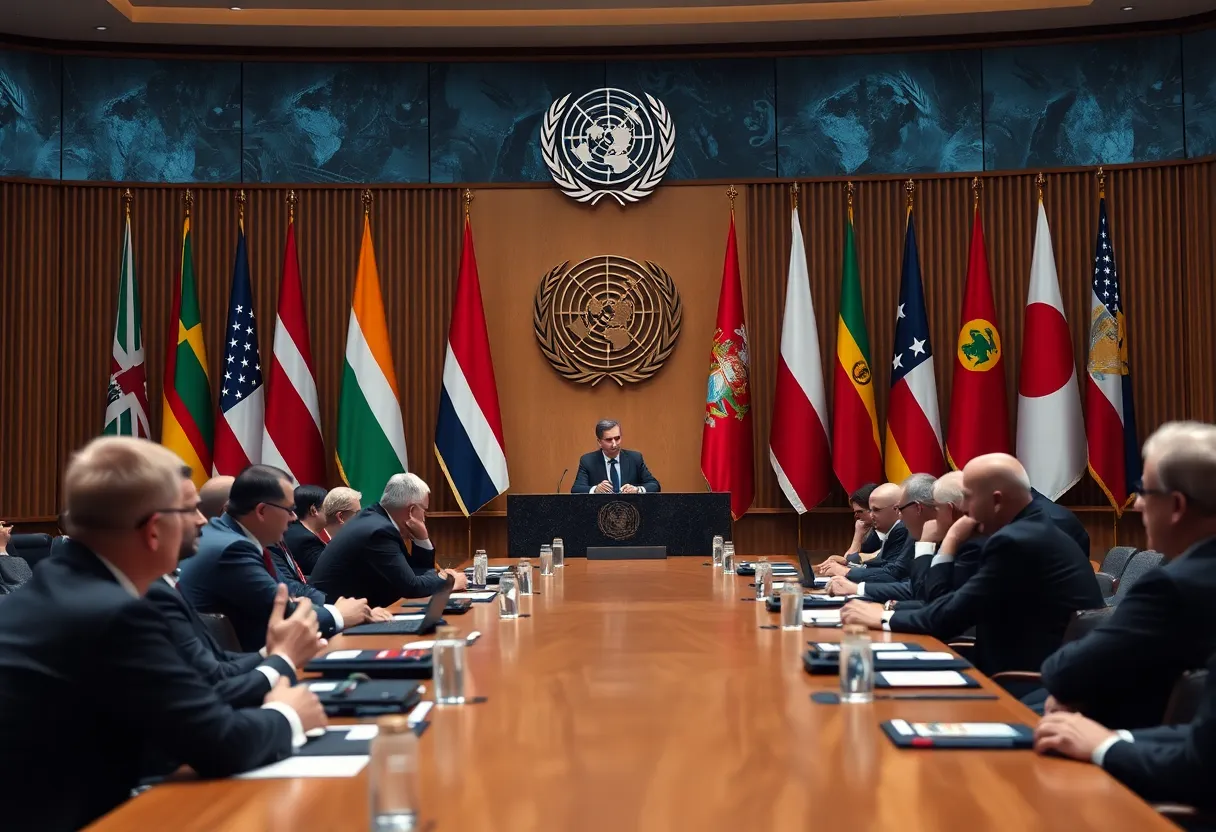

Tensions rise as countries debate the conflict in Ukraine at the UN General Assembly.
The US has made a controversial decision to vote against a UN resolution condemning Russia’s invasion of Ukraine, creating a divide with European allies. This shift raises questions about US foreign policy as tensions increase between the US, Ukraine, and its traditional partners. The vote reflects a momentous change in the approach to the ongoing conflict, as the US abstained from its own resolution, leading to a significant rift in international diplomacy regarding Russia’s actions.
In what many are calling a stunning policy shift, the United States has voted against a UN General Assembly resolution condemning Russia’s invasion of Ukraine, just as the war marked its third anniversary. This decision has sent ripples through the international community, creating a divide between the US and its longstanding European allies.
The Ukrainian and European-backed resolution received an impressive 93 votes in favor, underlining a strong international consensus on the need for Russia to immediately withdraw its troops from Ukraine. However, the US, which is used to standing side by side with its allies in such matters, took a different route by aligning its vote with Russia. This surprising move has left many wondering about the implications for global diplomacy.
The US abstained from voting on its own resolution, which had been drafted under special circumstances. Unfortunately, the resolution failed to label Russia as the aggressor or recognize Ukraine’s territorial integrity, raising concerns about its intentions. It appeared that this was more of a tactical move rather than one driven by a robust policy approach.
This shift in policy comes amidst ongoing discussions involving former President Trump, who has ramped up his rhetoric against Ukrainian President Volodymyr Zelensky. By calling Zelensky a “dictator” for not conducting elections during wartime, Trump has complicated the narrative surrounding the conflict, further distancing the US from its European partners.
The US also introduced an alternative resolution in the UN Security Council, which did not label Russia as the aggressor. This resolution received support from 10 votes, primarily organized by Russia itself, but drew five abstentions from European nations, highlighting a significant rift even among traditional allies.
European ambassadors, including those from France and the UK, wasted no time in condemning the US resolution. They emphasized that the failure to acknowledge Russia’s aggression undermines any genuine peace process. To them, accountability for Russia’s actions in Ukraine is essential for moving toward a lasting solution.
Meanwhile, US Deputy Ambassador Dorothy Shea acknowledged the tragic loss of life in the ongoing conflict, asserting that the objective was to pave a path toward peace. Still, European representatives clashed in their beliefs, reiterating that without holding Russia accountable for its aggressive actions, true peace will forever remain out of reach.
These developments reflect not just a momentary lapse but a potential new direction in US foreign policy related to Ukraine. Discussions between Trump and key European leaders, including French President Emmanuel Macron, highlighted the growing rift in a collective approach toward Ukraine. This suggests that the previously unified stance of Western nations on Russia’s actions could be unraveling.
Ukraine’s Deputy Foreign Minister, Mariana Betsa, reaffirmed her nation’s right to self-defense against the ongoing invasion. This statement codifies the commitment to respond to threats, firmly placing responsibility on Russia for the ongoing conflict. The General Assembly resolution, introduced by Ukraine, calls for comprehensive accountability for Russian war crimes and pure military withdrawal. It can be seen as a direct challenge to the US’s newly adopted approach.
The US’s abstention from its own resolution indeed indicates a strategy change. It appears that Ukraine feels pressured to withdraw its own resolution in favor of the US proposal, adding yet another layer of complexity to an already intricate situation. As discussions continue at the United Nations, the global community will be watching closely to see how this evolving dynamic influences the future relationship between the US, Ukraine, and its European allies.
As the war in Ukraine continues, it is becoming increasingly evident that the international landscape surrounding this conflict is shifting. The coming weeks will be crucial in determining the direction of US foreign policy and its long-term effects on the fragile peace in the region.
News Summary On a normal Thursday evening, an Amtrak train struck three family members in…
News Summary In a significant development, GOP Representative Anna Paulina Luna is advocating for remote…
News Summary A Michigan couple, Paul and Christy Akeo, spent nearly a month in a…
News Summary Communities from Kentucky to Missouri are reeling from a devastating tornado outbreak that…
News Summary The Trump administration has fired General Timothy Haugh, the director of the NSA,…
News Summary The annual CORK wine festival in Shreveport has been rescheduled to April 6,…